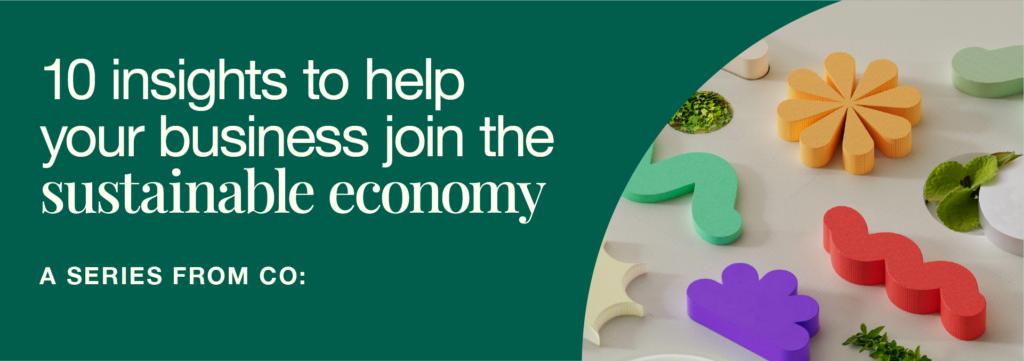Collaboration is the key to building a sustainable economy
The pursuit of endless growth has fueled a degenerative economy. Working with, not against, your competitors is the only path to a more sustainable one.

This is the third of a series of 10 insights from co:collective on how your business can join the sustainable economy.
20th century economics is killing our planet.
For decades business schools have been teaching future leaders to relentlessly pursue growth at any cost. To pursue the highest rate of short term monetary return. To increase sales, market share and profits. And to crush the competition. They thought they were doing the right thing and we can’t blame them. But unfortunately, these practices have led to a degenerative economy that is rapidly destabilizing our delicately balanced planet on which all of our lives depend. Not good. Last century’s economic model has resulted in a world where our collective use of resources overshoots the ecological ceiling, already creating climate change, biodiversity loss, nitrogen & phosphorus loading and land conversion (source: Kate Raworth, Doughnut Economics.) Terrifying. We’re the first generation to see this. It’s abundantly clear that the growth model of last century does indeed have a cost. A big one. The good news is, we have an opportunity to turn this story around – by working with, not against each other and the planet.
It’s time to reimagine the shape of progress.
We need to create economies that tackle overshoot together – economies that are generative by design. Economies that work with and within the cycles of the living world so that resources are never used up, but used again and again. Where waste from one process is food for the next. This feels better. And we’re seeing examples of this popping up more and more. A Kenya-based company called Gjenge converts plastic waste into a readily available source of attractive building materials. And in the pet space, California-based company Doggie Beer Bones creates dog treats using spent grain from local craft breweries. Pretty cool. These social enterprises are designed to generate multiple forms of value and share it across the network. Models like these start to make pure growth focused companies look frankly…out-of-touch and out-of-date. The idea of using waste byproducts to create new products is one way to operate more sustainably. But there are others.
Collaboration is the unlock to more generative economies.
Moving away from a ‘growth at all cost’ economic model toward one that is more sustainable or generative for people and for the planet is no easy task. We get it. It requires industry players to work together and that can be easier said than done. But when businesses benefit and so does the industry at large, it’s hard to argue a case against it. For example, supply chain partnerships can be an effective way to demand healthier working conditions, more environmentally friendly manufacturing processes and improve standards for everyone. The Responsible Business Alliance, whose members include Intel, HP, IBM, Dell, Philips, and Apple are an excellent case in point. They’ve banded together to develop industry wide sustainability standards and fight problematic labor practices (source: Harvard Business Review).
Another way collaboration can accelerate a more generative economy is by sharing the investment in the journey to net zero. Most companies promise to achieve it, but few want to take the short term financial hit to fund a net-zero transition. Good news is they don’t have to. If their reluctance to fund it causes a net-zero standstill, why not break the inertia and pool resources to fund the innovation they all need? It’s a win-win.
Balance is the new growth
We’re taught growth is good. We want our children to grow, our gardens to grow. Growth is a healthy natural source of life. But nothing in nature grows forever. So we shouldn’t expect it for our economies. It’s time to focus on building businesses that help create balance within social and ecological boundaries of the planet. And as a friend and colleague recently reminded me, boundaries shouldn’t make us feel bound – boundaries instead have the power to unleash our potential.

Key takeaways:
→ Generative economies must replace growth economies in the 21st century for us to balance the needs of all people within the means of our extraordinary living planet.
→ Progress should be measured in financial returns, but not in isolation. We need a new dashboard of success indicators that support human and planetary wellbeing.
→ It’s through collaboration that we’ll unlock a sustainable, generative economy. Work with, not against, your competitors to change your industry as a whole.

By Jenn Torry
Senior Business Design Director
Jenn Torry is a business designer who specializes in helping companies solve hairy systemic problems that require collaboration to fix. She is passionate about environmental causes and outside of co: acts as an advisor to startup founders looking to find the right product-market fit.
